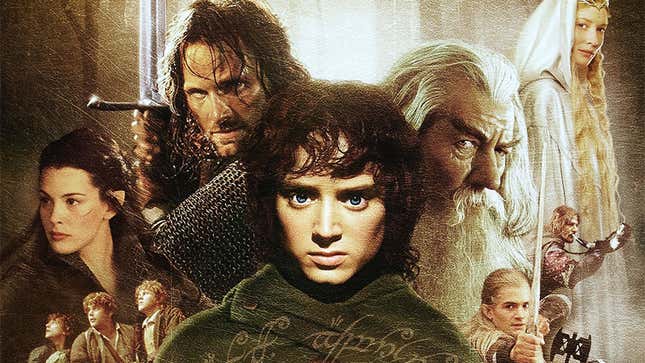
The Embracer Group, who are slowly buying any and every video game publisher and studio on the market, just announced that they have purchased Middle-earth Enterprises, the company that owns the big-and-small-screen rights to most of J.R.R. Tolkien’s most important works, including Lord of the Rings and The Hobbit.
Some background (and please bear with me, this gets complicated): Middle-earth Enterprises used to be a division of The Saul Zaentz Company, a Hollywood production studio that in 1976 managed to pick up the rights to pretty much everything to do with Tolkien except the publication of the books themselves. Those rights were used to make the 1978 animated feature, and ever since have only been licensed out to other companies—an operation overseen by Middle-earth Enterprises—and never fully sold.
That means everything from Peter Jackson’s films to EA’s video games were only (expensively) licensing the Lord of the Rings rights. (Amazon’s upcoming TV series, meanwhile, relied on a loophole that excluded a TV series of more than eight episodes being included within Zaentz’s rights.) Final ownership still lay with The Saul Zaentz Company, and covered “a vast intellectual property catalogue and worldwide rights to motion pictures, video games, board games, merchandising, theme parks and stage productions relating to the iconic fantasy literary works The Lord of the Rings trilogy and The Hobbit by J.R.R. Tolkien.”
Or, it did. Until now.
The Saul Zaentz Company floated the sale of their rights earlier this year for an eye-popping $2 billion, and while Embracer’s purchase price wasn’t disclosed in their announcement, you’d assume the price they paid would be somewhere in that ballpark. [Update: in a separate announcement, Embracer say the total cost for all the acquisitions they made today was SEK8.2 billion, which is around USD$770 million].
As the announcement says, the purchase covers pretty much everything you’d associate with Lord of the Rings beyond the publishing of the books themselves (whose rights are held by HarperCollins), including:
Key upcoming works set in Middle-earth, in which Middle-earth Enterprises has financial interests, include the much-heralded Amazon series The Lord of the Rings: Rings of Power which will premiere on September 2, 2022, set thousands of years before The Hobbit and The Lord of the Rings; the animated movie The Lord of the Rings: The War of the Rohirrim (Warner Bros), set for release in 2024, and the mobile game The Lord of the Rings: Heroes of Middle-earth (Electronic Arts).
Note that by purchasing Middle-earth Enterprises itself, Embracer doesn’t necessarily need to go cancel or reassign any existing Lord of the Rings rights agreements. Warner Bros. has held the motion picture license since the 1990s, for example—that’s how Peter Jackson’s trilogy was made—and the upcoming anime is clearly unaffected since it’s specifically highlighted in Embracer’s announcement.
As for what Embracer might want to do with the license in the future, that’s spelled out in the press release as well:
Other opportunities include exploring additional movies based on iconic characters such as Gandalf, Aragorn, Gollum, Galadriel, Eowyn and other characters from the literary works of J.R.R. Tolkien, and continue to provide new opportunities for fans to explore this fictive world through merchandising and other experiences.
With Embracer owning both a ton of video game studios and also board game company Asmodee (who in turn own Fantasy Flight), you can expect a lot of licensed games to follow suit as well. (Note that Asmodee already own the Lord of the Rings license for board games.)
Of course, it wouldn’t be an Embracer announcement without news that, alongside the Middle-earth Enterprises purchase, the company also bought a bunch of other stuff today, including physical copy specialists Limited Run Games, Tripwire Interactive (Killing Floor, Chivalry), Tuxedo Labs (Teardown) and, in a bizarrely poetic move given the buyers in question, Japanese studio Tatsujin. Their boss is Masahiro Yuge, a co-founder of Toaplan, the developers of Zero Wing, the game from which we got the “All your base belong to us” meme.